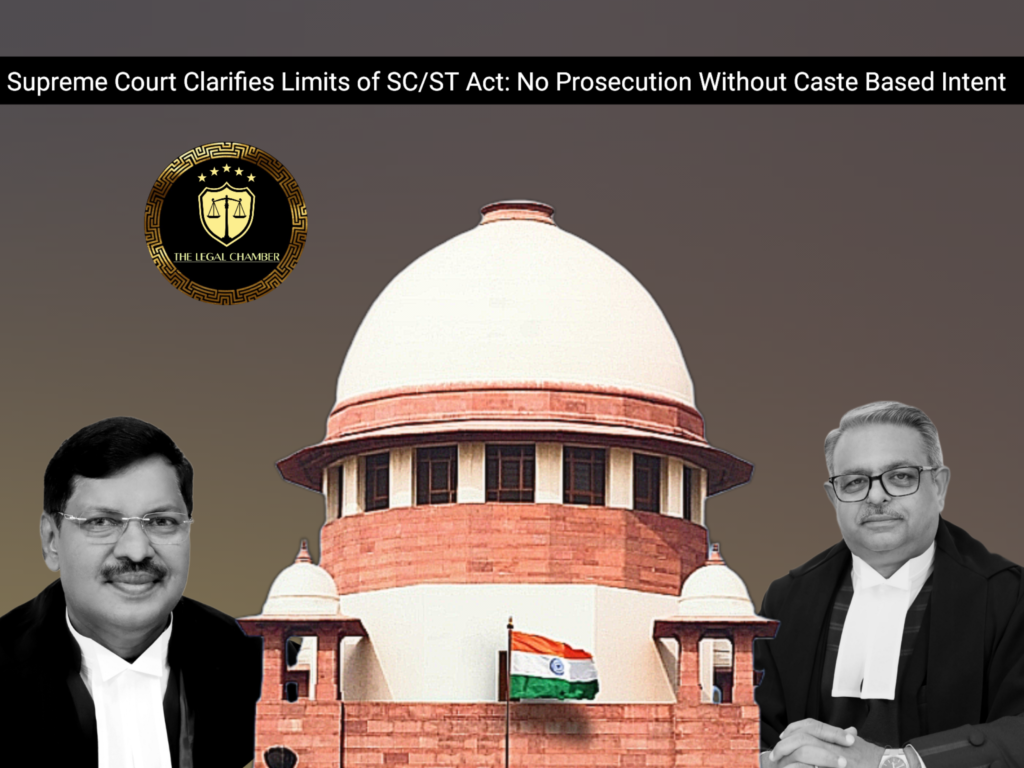
The Supreme Court dismissed the appeal, upholding the High Court’s quashing of proceedings under the SC/ST (Prevention of Atrocities) Act, 1989. It ruled that mere allegations of caste-based malice were insufficient without concrete evidence. The Court emphasized that prosecution under the Act requires proof of intent linked to the victim’s caste, preventing misuse for personal vendettas. Legal infirmities in the complaint and lack of prima facie case justified the quashing under Section 482 CrPC.
Facts Of The Case:
The case originated from a land allotment dispute in Duvva village, where the appellant, Konde Nageshwar Rao, alleged that Respondent No. 2, the Mandal Revenue Officer (MRO), manipulated the allotment of plots reserved for Scheduled Caste (SC) beneficiaries to upper-caste individuals related to Accused No. 3, a theatre proprietor. Rao, a Junior Accountant and SC member, objected to this irregularity, leading to his false implication in a 1995 criminal case involving a clash between two SC groups. Initially unnamed in the FIR, Rao was later added to the chargesheet at the behest of the MRO and the investigating officer (Respondent No. 1), allegedly as retaliation for his complaint.After Rao was exonerated in the criminal case due to lack of evidence, he filed a complaint under the SC/ST Act, accusing the respondents of malicious prosecution with caste-based intent. The High Court quashed the proceedings, noting the absence of caste-based malice and delays in filing the complaint. The Supreme Court upheld this decision, observing that the dispute was intra-caste and lacked evidence of discriminatory intent. It emphasized that the SC/ST Act cannot be misused for personal vendettas, especially where allegations are unsupported by substantive proof. The Court also noted the MRO’s compliance with government directives in the land allotment, further weakening the appellant’s claims.
Procedural History:
The procedural history of the case began with the appellant, Konde Nageshwar Rao, filing a complaint under the SC/ST (Prevention of Atrocities) Act, 1989, against the respondents, including a Mandal Revenue Officer (MRO) and a police officer, alleging malicious prosecution in a 1995 criminal case. The Magistrate took cognizance of the complaint, leading to the registration of P.R.C. No. 25 of 2004. The respondents approached the High Court of Telangana and Andhra Pradesh under Section 482 of the CrPC, seeking quashing of the proceedings. The High Court allowed their petition in 2014, quashing the case on grounds of insufficient evidence and lack of caste-based intent.Aggrieved by this order, the appellant filed Criminal Appeal No. 555 of 2018 before the Supreme Court. During the pendency of the appeal, Respondent No. 1 (the police officer) passed away, and his name was subsequently deleted from the case. The Supreme Court, after examining the evidence and legal arguments, upheld the High Court’s decision, ruling that the allegations did not meet the threshold for offences under the SC/ST Act and that the proceedings were rightly quashed to prevent misuse of the law. The appeal was dismissed in 2025, affirming the High Court’s judgment.
READ ALSO :Abuse of Legal Process? : Supreme Court Quashes Second Petition , Not Allowed Without New Grounds
Court Observation:
The Supreme Court made several key observations while dismissing the appeal. It noted that for an offence under the SC/ST Act to be established, there must be clear evidence of caste-based discriminatory intent, which was absent in this case. The Court emphasized that the dispute was essentially between members of the same Scheduled Caste community, making allegations of caste-based atrocities unsustainable.The bench observed that the High Court had correctly exercised its powers under Section 482 CrPC to quash proceedings where the complaint appeared to be motivated by personal vendetta rather than genuine caste-based persecution. The Court reiterated that the SC/ST Act, while being a vital tool for social justice, cannot be misused to settle personal scores or harass individuals through false accusations.Significantly, the judgment cited precedents like Masumsha Hasanasha Musalman and Dr. Subhash Kashinath Mahajan, highlighting the growing trend of weaponizing the SC/ST Act for ulterior motives. The Court stressed that allegations must be supported by substantive evidence of caste-based malice, and mere membership in a Scheduled Caste does not automatically attract the Act’s provisions. The bench ultimately found no legal infirmity in the High Court’s decision to quash the proceedings.
Final Decision & Judgement:
The Supreme Court, in its final judgment, dismissed the criminal appeal and upheld the High Court’s decision to quash the proceedings under the SC/ST (Prevention of Atrocities) Act, 1989. The bench, comprising Justices B.R. Gavai and Augustine George Masih, concluded that the allegations lacked substantive evidence of caste-based malice required to sustain charges under the Act. The Court found that the dispute primarily stemmed from personal grievances rather than caste discrimination, and noted the significant delay in filing the complaint as undermining its credibility. Relying on precedents like Masumsha Hasanasha Musalman and Dr. Subhash Kashinath Mahajan, the judgment emphasized that the Act’s provisions should not be misused for settling personal scores. The Court affirmed that the High Court had appropriately exercised its inherent powers under Section 482 CrPC to prevent abuse of the legal process, thereby protecting the respondents from unwarranted prosecution. All pending applications, if any, were also disposed of accordingly. The judgment reinforced the principle that while the SC/ST Act serves as crucial social legislation, its application must be based on genuine instances of caste-based atrocities supported by credible evidence.
Case Details:
Case Title:Konde Nageshwar Rao vs. A. Srirama Chandra Murty & Anr Citation: 2025 INSC 886 Criminal Appeal No.: Criminal Appeal No. 555 of 2018 Date of Judgment: July 23, 2025 Judges/Justice Name:Justice B. R. Gavai & Justice: Augustine George Masih
Download The Judgement Here